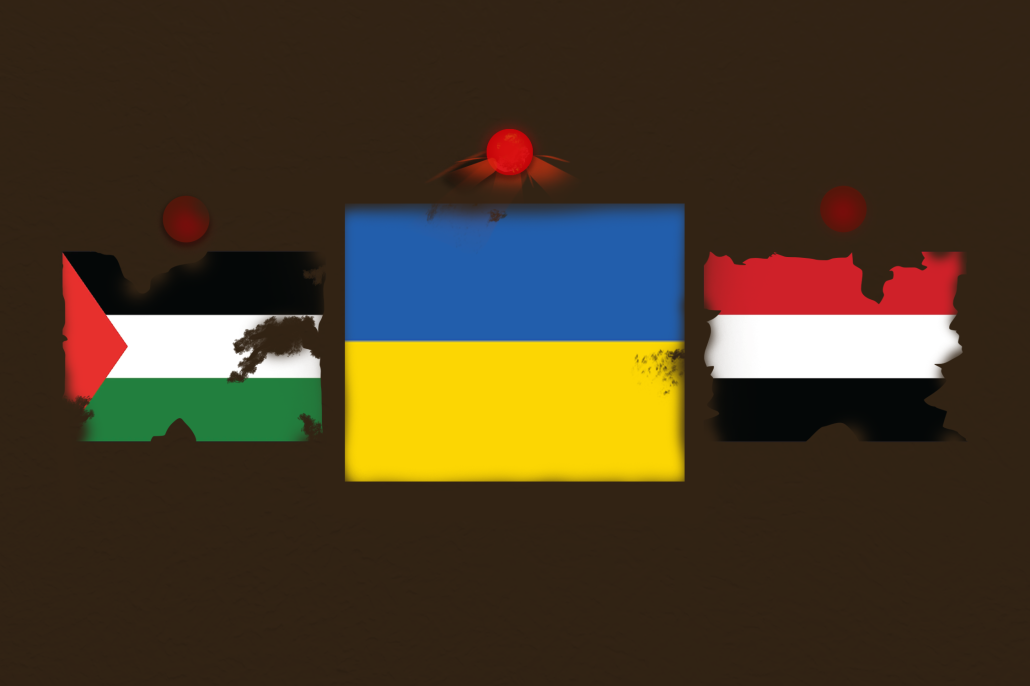The Eck’s Factor: Ukraine reminds us of the victims we prioritize

Content warning: This article contains references to war, death and violence.
As I sat with my 30-pound suitcase wedged between my ribs and lap in a ride-gone-wrong back from the airport, I fretted about the minuscule chance its inertia would slaughter us all in a car crash. I scrolled to the bottom of my Uber app to start typing driver feedback, but above the “HELP” button, a flag — blue then yellow stripes — averted my gaze.
While my privilege allowed me to squat in Parisian cafés and try authentic Dim Sum for the first time over spring break, Russia continued to terrorize Ukraine. As Ukrainians fled their homes, I left a Southwest terminal and encountered Uber’s donation page for Ukrainian relief, a recent partnership with the International Rescue Committee.
First and foremost, my heart goes out to the people and their families impacted by Russia’s war on Ukraine. We must condemn Putin’s senseless imposition of violence upon the innocent people of Ukraine.
With that being said, the outpouring of support for Ukraine has also raised issues. News reporters, such as ITV News Correspondent Lucy Watson, summarized the humanitarian crisis in Ukraine in an all-too-racist and disturbing way: “The unthinkable has happened … this is not a developing, third-world nation; this is Europe!”
These “third-world” nations experiencing humanitarian crises, such as Palestine and Yemen, warrant the same support as Ukraine. Unfortunately, as evidenced by the world’s disproportionate attitudes toward violence against Europeans and white people, equitable support, sadly, is not a reality.
Ukraine’s Deputy Chief Prosecutor David Sakvarelidze even expressed this attitude by stating, “It’s very emotional for me because I see European people with blue eyes and blonde hair being killed.” These racist attitudes toward violence against Middle Eastern and African countries make this request for equitable support seem impossible.
The double standard of crises that “deserve our attention” manifested at the University of Chicago, which offered scholarships to students impacted by the Russian war on Ukraine.
In another — dare I say, strange — example, President Carol Folt conflated the Ukrainian crisis with a post about International Women’s Day wrting, “On this International Women’s Day, the women of Ukraine are in my heart. Many have had to leave their homes, their loved ones, literally carrying their children on their backs to find safety. Others are joining in the fight to defend their families and their homeland desperate for peace and freedom.”
Folt has never voiced this kind of support for Syrian or Palestinian women before, so this gesture, despite its good intentions, comes off as yet another Eurocentric perspective that pits the lives of white people above the lives of others. Of course, the women of Ukraine are in my heart — but where is this same energy for Palestinians defending their homeland?
These superficial institutional cries of support overshadow Ukraine’s refugee crisis and the reality of its military. When we donate to Ukraine’s military, we think of helping innocent Ukrainian citizens. We don’t think of Ukraine’s military ties with a volunteer group called the Azov battalion, which contains members with close ties to neo-Nazi groups. We don’t think of Ukrainian border guards blocking Africans and other immigrants from crossing into Poland.
We should, however, denounce imperial nations’ colonial patterns and NATO’s role as a “war machine of imperialism.” It is not mutually exclusive to denounce Russia’s actions and call attention to military intervention’s historical harm, undermined by its supposed protection. For instance, Viet Thanh Nguyen, author of Pulitzer Prize-winning novel “The Sympathizer” and professor at USC, shared his thoughts regarding the conflict on his Instagram account.
“I fled from Viet Nam as a refugee in 1975 and came to the United States. While I’m grateful for American aid, I wouldn’t have needed American aid if the United States hadn’t invaded Viet Nam in the first place,” Nguyen wrote. “As a refugee, I am aware that wars kill more civilians than soldiers, and that wars always produce refugees.”
Not to mention the fact that, according to a The Economist poll, 42% of Americans still believe that Russia is a communist state, which speaks to our knowledge gap still prompted by the Red Scare. Although that fact doesn’t invalidate Russia’s invasion or Ukrainians’ suffering by any means, millions of Americans’ collective attitude toward violent intervention still follows the “Communism is bad, so we must protect democracy” rhetoric. We must question the nationalist narratives we spread among each other and what these narratives imply about the value of non-Western and non-European countries.
Particularly and ironically, we falsely label Russia as an authoritarian communist state, yet NATO sanctions Russian oil. As a result, the U.S. must look to Saudi Arabia to replace its oil import. Saudi Arabian military intervention in Yemen, however, has killed more than 370,000 civilians and put millions at risk of famine. Yemen has not received the attention we bestow to Ukraine, which further pushes the narrative of Middle Eastern countries as inferior.
War will tear us apart, and those of us fortunate enough to have never witnessed such violence must maintain compassion for all innocent civilians in all countries, including the marginalized communities at home who suffer trauma from living in environments with elevated violence. Our hearts must go out to all of them, not just Ukraine.
Please consider donating to these organizations that provide humanitarian aid to civilians in Ukraine, Palestine and Yemen, respectively:
https://www.icrc.org/en/donate/ukraine
https://donate.unrwa.org/-landing-page/en_EN
https://irusa.org/middle-east/yemen/
Matthew Eck is a senior writing about hot-button social issues. His column “The Eck’s Factor” runs every other Wednesday. He is also the Wellness & Community Outreach Director at the Daily Trojan.

